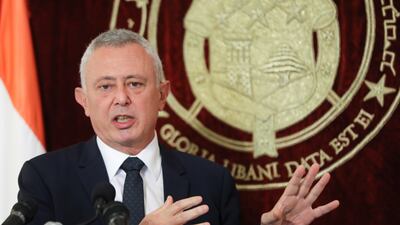A French diplomat has told The National that Suleiman Frangieh, leader of the Christian Marada party and the Hezbollah-backed candidate, is still considered an option for Lebanon's presidency by Paris.
Recent reports suggested that France had withdrawn its support for Mr Frangieh.
But the source said: “Nothing has changed. It is still deemed the most pragmatic option in the current context, given the absence of a more viable solution.”
Paris has long endorsed a formula involving Mr Frangieh serving as the head of state, balanced by someone from the opposing camp as prime minister.
One potential candidate for the prime ministerial role often mentioned in this context is diplomat Nawaf Salam.
“We maintain a non-veto stance on any candidate, and should a stronger option emerge, we are open to re-evaluating our choice”, said the diplomat.
The French government views this as the sole option to overcome a political impasse, as Lebanon finds itself in its eighth month without a president since the conclusion of former president Michel Aoun's term on October 31.
Mr Frangieh visited Paris in April in response to an invitation from Patrick Durel, adviser to the Elysee on Middle Eastern and North African affairs.
According to the French diplomat, a viable candidate for the Lebanese presidency should support the crucial set of reforms requested by the International Monetary Fund (IMF).
Lebanon has since 2020 been negotiating to secure an aid package from the IMF to alleviate the country's severe economic crisis.
In a deeply polarised Lebanon, Frangieh is seen as the candidate of Hezbollah — the Iran-backed party opposing those traditionally more aligned with the Saudis.
But recent developments indicate potential change in Saudi Arabia' stance.
On Thursday, Mr Frangieh met Saudi ambassador to Lebanon Walid Bukhari, who the presidential front-runner described as “cordial and excellent”.
Last week, Mr Bukhari said that his country viewed the presidential election as an internal matter and emphasised that the kingdom would not exercise a “veto” on any candidate.
The source added that Mr Frangieh was not, strictly speaking, France's designated candidate for the presidency.
“Lebanon holds sovereignty over who they elect, our involvement to support the most realistic option is a way to speed up the process, as, despite the urgency of the situation, Lebanon has faded away from the international agenda,” said the source.
French Saudi talks
“Following extensive talks between France and Saudi Arabia, the kingdom has now made it clear that it does not object to Mr Frangieh's election,” said political scientist Karim Emile Bitar.
“While they might not be very enthusiastic, France's endorsement of this formula would not have happened without Saudi Arabia in the loop.”
He added that “there is no more reason for the kingdom to object to Mr Frangieh in Lebanon”, in light of recent geopolitical developments including Syria's return to the Arab League and the Saudi-Iranian detente.
But Mr Frangieh is still far from being a consensual figure within the Lebanese political landscape.
On Wednesday, Sami Gemayel, the leader of the Christian Party Kataeb, said he refused any Hezbollah-backed candidate, claiming that the opposition “first want to prevent Hezbollah's takeover of the presidency and then suggest a name”.
“If Hezbollah continues to impose its decisions on the Lebanese, that could lead to civil war,” he added. “We can't accept being crushed.”
Against this backdrop, opponents of Mr Frangieh have been critical of the French position.
“It is perceived as cynical. Some people pointed out that economic interests could be at stake, while the French argue that the main concern is the stability in Lebanon,” Mr Bitar said.
“Realpolitik governs the dynamics at play, but it is also understandable as the situation could potentially deteriorate further with a presidential vacuum.”
From the French perspective, “Mr Frangieh is not France's candidate, but the candidate of the strongest political party in Lebanon, and France is trying to mitigate the damage by making sure there is a deal”, he said.
The Lebanese parliament remains deeply polarised. Despite convening 11 times, with no 12th vote scheduled, it is still unable to elect a new president.
Speaker Nabih Berri has called for a June 15 deadline and said “regional and international climate regarding the presidential elections are encouraging”.


